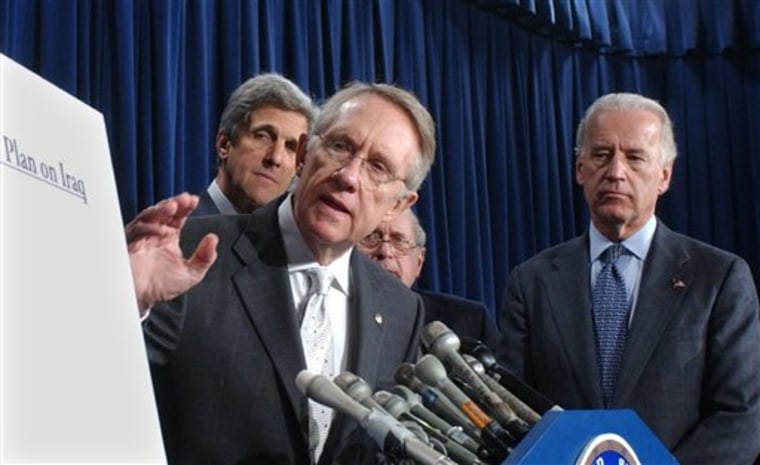Democratic-backed legislation to withdraw U.S. combat troops from Iraq cleared its first Senate hurdle Wednesday, but Republicans confidently predicted they would soon defeat it and President Bush backed them up with a veto threat.
The legislation, calling for combat troops to return home over the next 12 months, "would hobble American commanders in the field and substantially endanger America's strategic objective of a unified federal democratic Iraq," the White House said in a written statement.
The strong veto message underscored the intensifying struggle between the administration and the new Democratic-controlled Congress and came on a day in which the Pentagon conceded in a report that "some elements of the situation in Iraq are properly descriptive of a civil war."
Number of measures pending
President Bush and other administration officials have avoided saying that U.S. troops had been thrust into the midst in a civil war among Iraqis. By whatever name, the war has so far has claimed the lives of at least 3,200 U.S. troops, cost more than $300 billion and propelled congressional Democrats to power in last fall's elections.
Democrats in the House and Senate are advancing different bills calling for the withdrawal of troops. Bush has threatened to veto both.
In the House, Democratic leaders said they were building support behind legislation to require the withdrawal of troops by Sept. 1, 2008, if not sooner. That plan faces its first test vote Thursday in the Appropriations Committee, and Democrats circulated a letter of support from retired Gen. Wesley Clark, the former NATO commander who ran for president in 2004.
In contrast with the House bill, the Senate measure lacks a firm deadline for an end to U.S. participation in combat. It says a withdrawal should begin within 120 days "with the goal of redeploying, by March 31, 2008, all United States combat forces from Iraq except" for those needed for non-combat roles.
The only Iraq-related vote of the day was an 89-9 procedural roll call that cleared the way for a formal debate on the legislation in the Senate.
Measured support
Sen. Russell Feingold, D-Wis., said the legislation does not go far enough, but added he intends to support it because "it does not allow the president's misguided policies to continue. It does not tacitly reauthorize the war." The Wisconsin Democrat said he would keep trying to press his own measure, which calls for limiting the use of defense funds in Iraq to achieving a troop withdrawal.
Sen. Edward M. Kennedy, D-Mass., another vocal critic of the war, said, "The American people are far ahead of the administration. We have an obligation to stand up for our troops and stand up to our president when he stubbornly refuses to change course in Iraq."
But Senate Republican Leader Mitch McConnell said passage of the withdrawal measure "would be absolutely fatal to our mission in Iraq" - and he sought to rebut Democratic supporters with their own words.
He quoted Democratic leader Harry Reid of Nevada as saying in 2005 that setting a timeline was "not a wise decision because it only empowers those who don't want us there, and it doesn't work well to do that."
McConnell also quoted New York Sen. Hillary Rodham Clinton, a presidential contender, as having said in September 2005: "I don't believe it's smart to set a date for withdrawal. I don't think you should ever telegraph your intentions to the enemy so they can await you."
Democrats who have made similar comments "know just as well as I do that this is what the terrorists have been waiting for - and just what our allies in Iraq and the entire region of the world have feared," McConnell said.
Reid is the party's point man for the legislation pending in the Senate.
"To take a statement that I made five years ago, to think that things haven't changed in five years is without any degree of sensibility," Reid responded to McConnell a few moments later on the Senate floor. He apparently misspoke when he cited the age of his 2005 statement.
Clinton's office had no immediate reaction. In an interview published online Wednesday by The New York Times, the Democratic presidential candidate said that if elected she would maintain a scaled-down American military force in Iraq that would stay off the streets in Baghdad and would no longer try to protect Iraqis from sectarian violence. She cited "remaining vital national security interests" for a continued deployment of American troops in Iraq aimed at fighting al-Qaida, deterring Iran, protecting Kurds and possibly supporting the Iraqi military, the newspaper reported.
GOP confident of set date failure
Senate Republicans had previously thwarted two attempts to hold a full-fledged debate over the war, accusing Democrats of failing to give equal treatment to GOP alternatives. The result was unease among some members of the GOP rank-and-file, who feared they would be tagged with trying to block debate on the most pressing issue facing the country.
Republicans also have concluded they can derail the measure when it comes to a final vote.
Despite the legislation's dim prospects, Democrats insisted the developments marked progress toward their eventual goal of forcing the president to end U.S. participation in the war.
Democrats hold a shaky majority in the Senate. And with Sen. Joseph Lieberman, an independent Democrat, expected to oppose the measure and Democratic Sen. Tim Johnson of South Dakota recuperating from a brain hemorrhage, Reid said on Monday he was not certain whether even a bare majority would support the legislation.
Earlier jockeying had occurred around a nonbinding measure that criticized Bush's decision to increase the number of troops in Iraq. Several Republicans had appeared ready to support that measure. In contrast, Republican aides said any defections on the legislation containing a timetable for withdrawal would be far fewer in number - and perhaps none at all.
